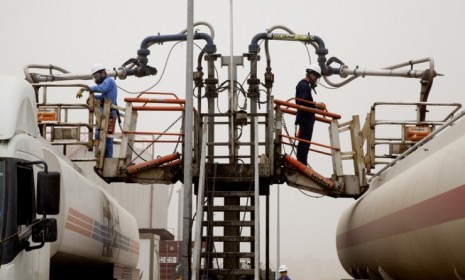Iraq's well-timed oil boom: A concise guide
Just as world markets brace for the loss of Iran's oil, Iraq is finally producing more crude than it did under Saddam Hussein

A free daily email with the biggest news stories of the day – and the best features from TheWeek.com
You are now subscribed
Your newsletter sign-up was successful
Iraq is still something of a mess, with deadly bombings and political infighting casting a cloud over the country's future. But Iraq's long-troubled oil industry is turning into a crucial success story. Production is booming — exceeding pre-war levels for the first time — and not a moment too soon. The Iraqi government can't rebuild or provide the services its people need without oil income. And the increased flow from Iraq will help replace the loss of Iran's crude, due to sanctions targeting Tehran's oil industry, potentially helping to avert a global crisis. Is Iraq finally realizing its potential to be a leading oil producer? Here, a brief guide:
How much oil is Iraq producing?
Iraq pumped 3 million barrels a day in April, up 7 percent from the month before. Its exports hit 2.5 million barrels per day, a 20 percent jump from where it was last year. Those levels match or beat anything the country accomplished under Saddam Hussein, who took power in 1979 and was swept aside by the 2003 U.S.-led invasion. By year's end, Iraq's Oil Ministry aims to blow past Iran — whose production declined to 3.2 million barrels a day in April for the first time since 1988 — to become the second largest producer in OPEC, after Saudi Arabia.
The Week
Escape your echo chamber. Get the facts behind the news, plus analysis from multiple perspectives.

Sign up for The Week's Free Newsletters
From our morning news briefing to a weekly Good News Newsletter, get the best of The Week delivered directly to your inbox.
From our morning news briefing to a weekly Good News Newsletter, get the best of The Week delivered directly to your inbox.
What sparked the boom?
After decades of war, sanctions, and neglect, Iraq's oil industry was a wreck. Control rooms and refineries, many of them built in the 1950s, had been ruined by sabotage and looting. As the security situation improved, oil production began rising in 2009 and 2010, thanks largely to the arrival of foreign companies like Exxon Mobil, BP, China National Petroleum Corporation, and ENI of Italy, which signed contracts with the government and brought in modern equipment and techniques to get the crude flowing from Iraq's old oil fields. And the increase Iraq has seen so far may be only the beginning.
Is Iraq going to start pumping even more oil?
It certainly could. Its oil reserves are the fifth largest in the world. The Oil Ministry aims to get up to 10 million barrels per day by 2017, a target Iraqi officials only recently lowered from 12 million barrels. That would put Iraq in the league of the world's No. 1 exporter, Saudi Arabia, which is producing at its full capacity of 12.5 million barrels per day.
A free daily email with the biggest news stories of the day – and the best features from TheWeek.com
What stands in Iraq's way?
Iraq needs a lot of new infrastructure to get more oil out of the ground and into tankers for export — from a water project to increase the well-pumping power to new stretches of pipeline and a new port. And the country's Shiite, Sunni, and Kurdish factions still squabble over the division of oil revenues, so every step creates the potential for political battles that can cause significant delays. Still, it's reasonable to expect Iraq to reach six to 10 million barrels a day by early in the 2020s, Hans Nijkamp, Royal Dutch Shell's Iraq country chairman, tells The New York Times, and that "is really substantial."
Sources: Al-Arabiya, Bloomberg, NPR, New York Times, USA Today
-
 The environmental cost of GLP-1s
The environmental cost of GLP-1sThe explainer Producing the drugs is a dirty process
-
 Greenland’s capital becomes ground zero for the country’s diplomatic straits
Greenland’s capital becomes ground zero for the country’s diplomatic straitsIN THE SPOTLIGHT A flurry of new consular activity in Nuuk shows how important Greenland has become to Europeans’ anxiety about American imperialism
-
 ‘This is something that happens all too often’
‘This is something that happens all too often’Instant Opinion Opinion, comment and editorials of the day